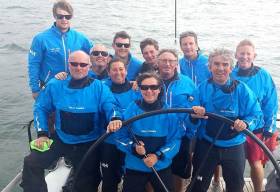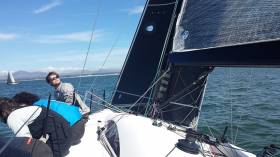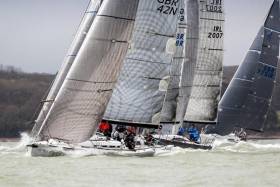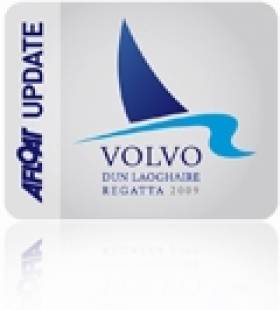Displaying items by tag: Conor Phelan
Jump Juice Retains Abersoch Keelboat Week Title With Big Margin
Conor Phelan’s Ker 37 Jump Juice defended her 2015 Abersoch Keelboat Week title in some style on Friday winning both the penultimate and the final races.
The Royal Cork yacht finished the regatta a whopping 11–points clear.
As Afloat.ie previously reported, despite the margin of victory, “Jump Juice” was pushed all the way by regular ISORA competitor Peter Dunlop and Vicki Cox’ J109 “Mojito” and John Batson’s Dehler 36 “Wombat”.
“Jump Juice” team for the week was:-
Bow: Ewan O’Keefe
Mast: James Coulson / Fergal McGrath / Tom Soar
Pit: Mary Barrett
Pit Assist: Selina Thomas
Trim 1: Dave Rowland
Trim 2: John Sisk / Jerry Ibberson
Trim 3: Adam Hyland
Float: Noirin Phelan
Mainsheet / crew boss: Maurice “Prof” O’Connell
Helm / Skipper: Conor Phelan
Tactician: Mike Budd
Results here
Royal Cork Yacht Jump Juice Extends Lead at Abersoch Keelboat Week
Conor Phelan's Jump Juice established a firm grip on Abersoch Keelboat Week yesterday, winning both races in very light airs. The Royal Cork YC Ker 37 was on fire in IRC 1, winning race six by over a minute and race seven by a whopping 24 minutes.
Two races are scheduled this morning in a medium air forecast for the final day. Fingers are crossed for a repeat of Jump Juice's 2015 victory, says mainsheet trimmer/crew boss Maurice O'Connell.
See results here.
Conor Phelan Is Afloat's Sailor of the Month for March
April has come upon us with so many podium positions suddenly taken by Irish sailors in major events that you could have been forgiven for thinking that our usual April 1st specials had been allowed to run on for a day or two extra writes W M Nixon. But before fully savouring the new successes, we must bid a final farewell to March, which had its moments of extreme excitement - and some taking of silverware too.
Nothing was more extreme than the RORC Easter Challenge in the Solent from March 25th to 27th, with the tail-end of the winter providing one final ferocious flick for a fleet which included several bats with Irish connections And within the series, nothing was more extreme than Black Sunday, March 27th, when hyper- black striker squalls of the kind that would make you wonder if the roof on the house was safe, let alone if you could carry extra downwind sails on the boat, were top of the agenda as they swept in at record speeds.
Yet Black Sunday was the best day for the Irish, with two wins being recorded in the final race. Until then, Anthony O’Leary’s Kery 40 Antix in the Fast40+ division had been had been out of the frame – albeit by a small margin – by what the owner had cheerfully admitted to be “silly mistakes”. But on that final day as mayhem was the experience of most of the fleet, Antix was beautifully in control at top performance, tearing up the Solent in a blaze of spray to take the final race win, though she wasn’t to finish first overall.
But in Class 2, Conor Phelan’s 2008-vintage Ker 36 Jump Juice had been lying second throughout the series, despite being up against some superbly-sailed boats which included America’s Cup sailors among their crews. Yet even the AC aces found themselves wiping out in spectacular style on Black Sunday, while Jump Juice streaked along in cool control to take the race win and the Class win overall to make Conor Phelan of Royal Cork YC the Afloat.ie “Sailor of the Month” for March 2016.
100 Boats Sailing in for July's Dun Laoghaire Regatta
Royal Cork's Anthony O'Leary, Afloat.ie's Sailor of the Year, is an early entry for July's Volvo Dun Laoghaire Regatta that has already attracted 100 entries, 50% of which are come from outside the Dublin Bay area.
The hope is O'Leary (who will be sailing Antix Beag) will be joined by a Crosshaven club mate Conor Phelan (sailing Jump), both are previous cruiser class winners in the 17-division championships that starts this year on July 7.
The biennial event, hosted by all four waterfront clubs, prides itself as Ireland's biggest sailing event. Seven nations and 32 yacht clubs are represented. So far 14 clubs are coming from England, two from Scotland, two from Wales, one from the Isle of Man and one from France.
The massive event that is expecting up to 500 entires is chaired this time by local sportsboat sailor Adam Winkelmann.
Dublin clubs have not been slow to enter early either. As expected Dun Laoghaire's own waterfront leads the way; The Royal Irish YC has 19, the National YC has 11, the Royal St George YC nine and the Dun Laoghaire Motor YC three entries.
An early entry discount is in operation for the next 28 days only. Enter here.Click this link for the latest Dun Laoghaire Regatta.
Join the Regatta on Afloat's facebook page here.
































































